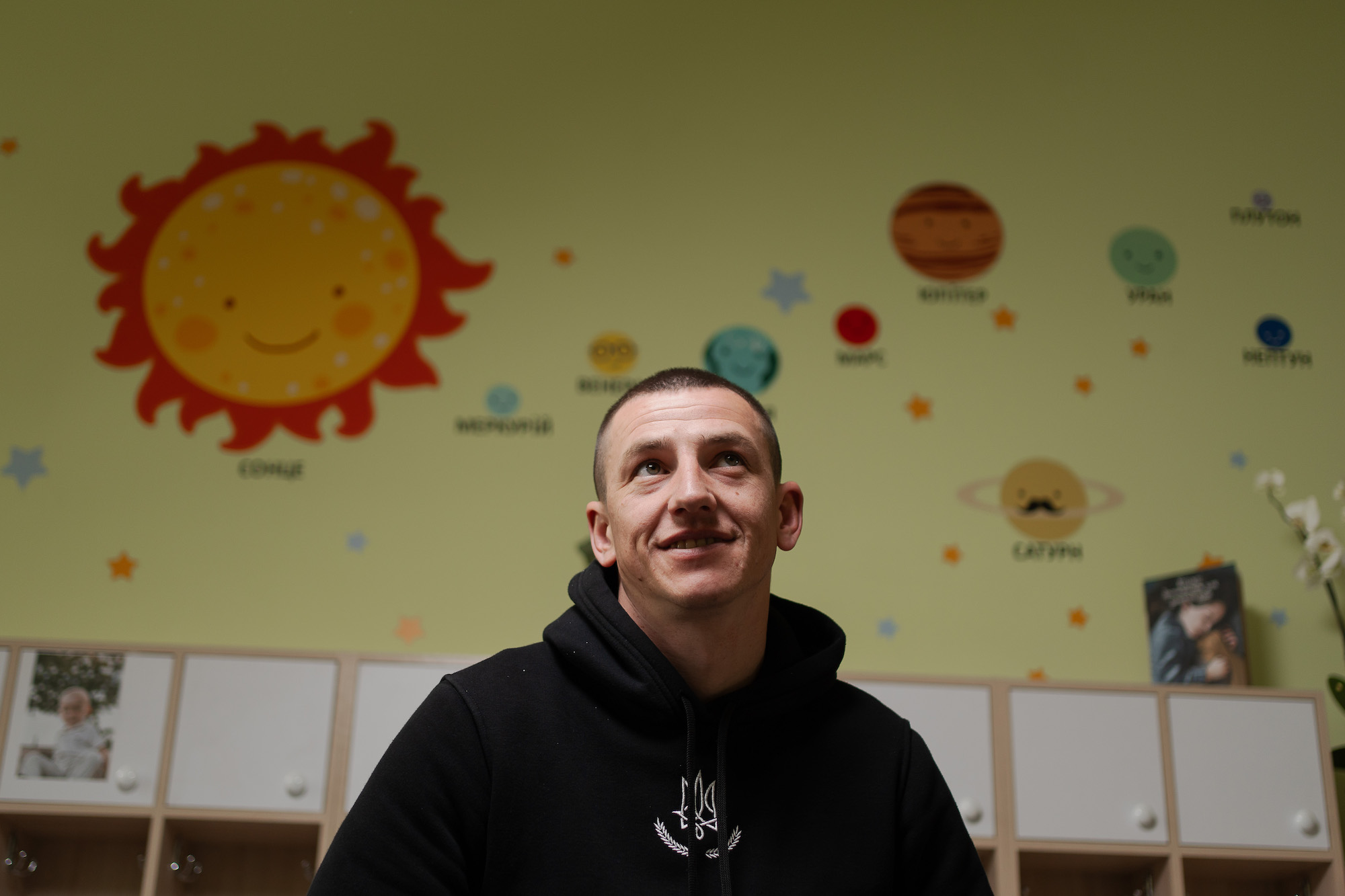
The battle subsides and you hear the birds singing
Lutsk, a relatively quiet western Ukrainian city during the war, is home to many soldiers and veterans, as well as numerous people who sought shelter from the shelling in the east of the country.
Taras, a veteran with prostheses on both legs, drives confidently, switching the music on the road. The gray Mercedes, with “Slovak” clearly visible on the windshield, flows into the stream of cars and feels almost equal among them. The road is calm, a stark contrast to those that Slovak drove a year ago.
“Once a man called and started crying, here you are, you have such trouble,” he says, keeping an eye on the road and the city flashing on both sides. − I say “Fellow, you haven’t seen trouble!” I have no trouble. My life on my iron legs will be twice as interesting as yours on the ones given by nature. That’s it. I hung up and blocked the number.
To be a voice
The city, as Taras Sasovskyi says, doesn’t trigger him due to the lack of ramps, inconvenient elevators, or missing handrails or steps on the sidewalks—those issues can be addressed. , So far, what triggers him the most is the city’s lack of understanding of the delicate moments experienced by people who have gone through the war and returned to these streets, whether temporarily or permanently.
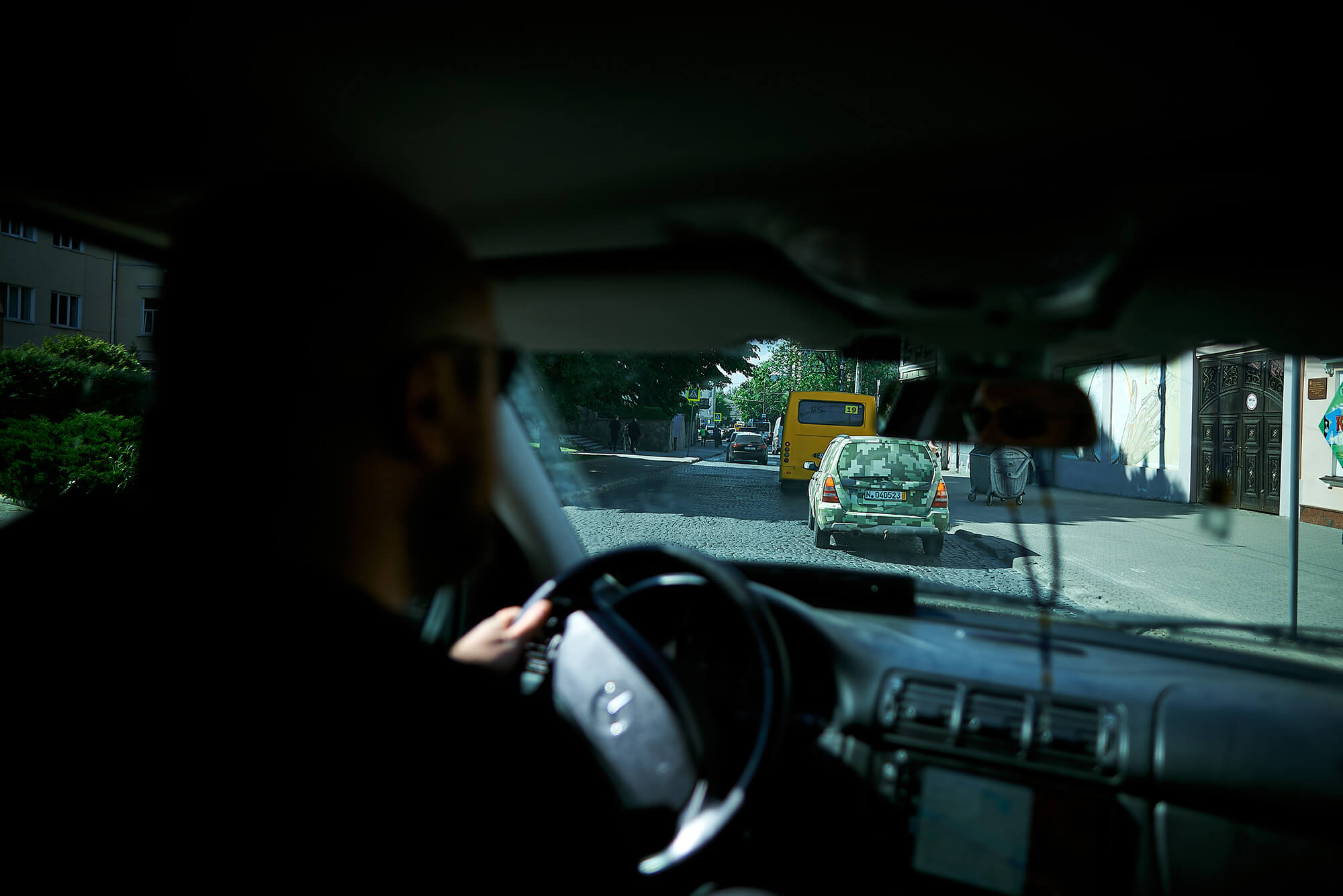
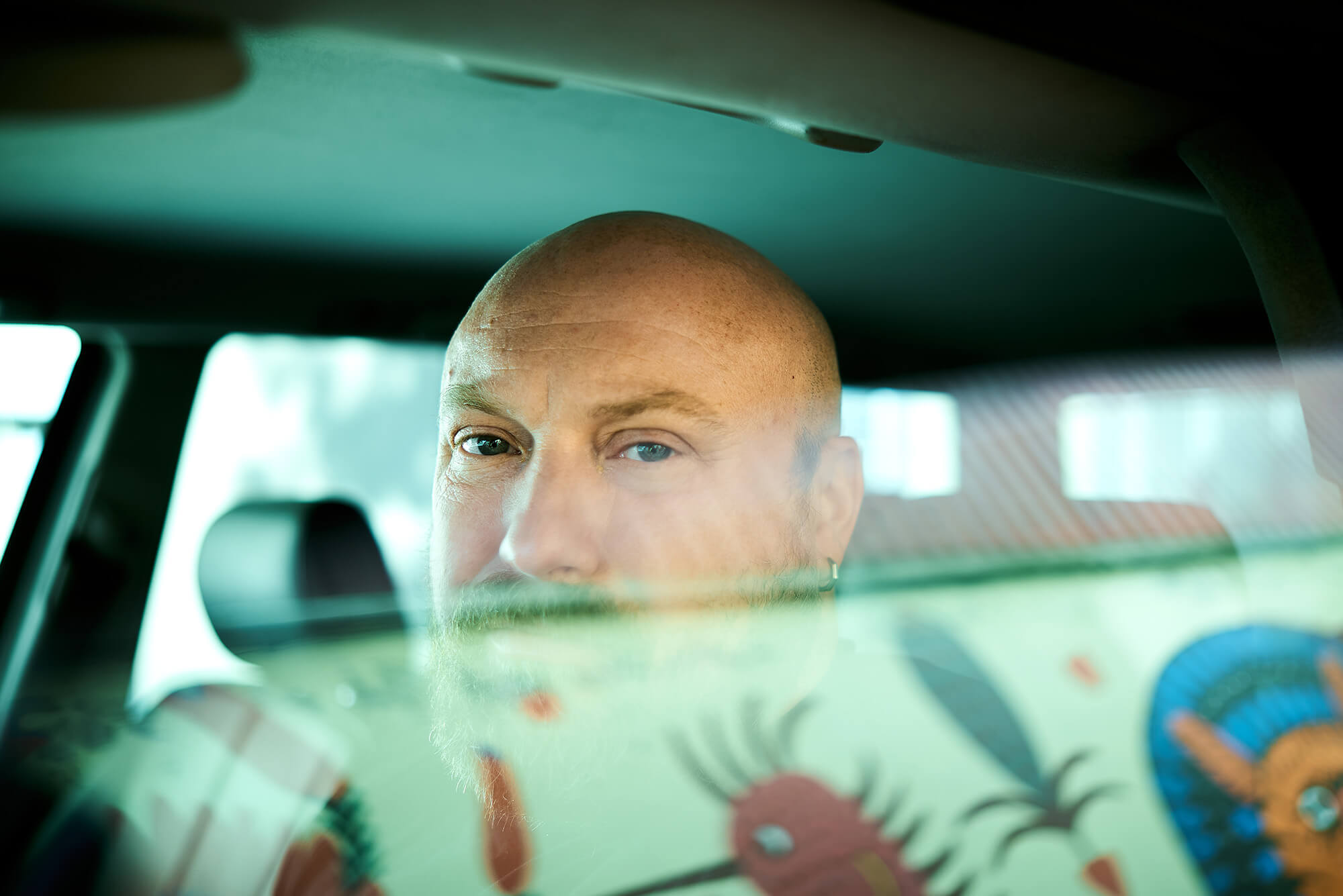
That’s why, after receiving a on prostheses, Taras, formerly a senior rifleman-operator of the 100th Volyn Brigade of Territorial Defence Forces (now the 100th Separate Mechanized Brigade of the Ukrainian Ground Forces), didn’t hesitate to choose his new path: teaching the city to understand and help veterans. And so he plunged into this work.
He became an adviser to the mayor on veterans’ issues and was named as the future director of the communal veteran’s hub, a new city program whose creation he is overseeing. To put it succinctly, Taras has become the voice of veterans with amputations in the city where he was born and now lives.
He strives to ensure that here his comrades or their relatives find answers to their painful questions and help them find their way in life after injuries and losses.
Before the war Taras was a man of business and concrete deeds, accustomed to getting things. done quickly and efficiently. Working in city government is different and unsual for him, but he knows it is important.
Near Bakhmut
“Four of my guys were brought to Lutsk a week before Easter. I attended three funerals, just because I didn’t find out about the fourth one in time. My friends ask me ‘Why didn’t you post photos from the competitions you won on social media?’ But I wasn’t in the mood. How important are the victories when there are funerals after funerals? How important are the medals when I buried someone with whom I had eaten from the same plate?”
The brigade of current veteran Taras Sasovskyi keeps defending the country, and it has settled on one of the most challenging fronts. . Many comrades came back “on the shield” after battles. There are also those who are destined to follow Taras’ road: to get back on their feet after severe wounds, and often in the literal sense—on new iron legs.
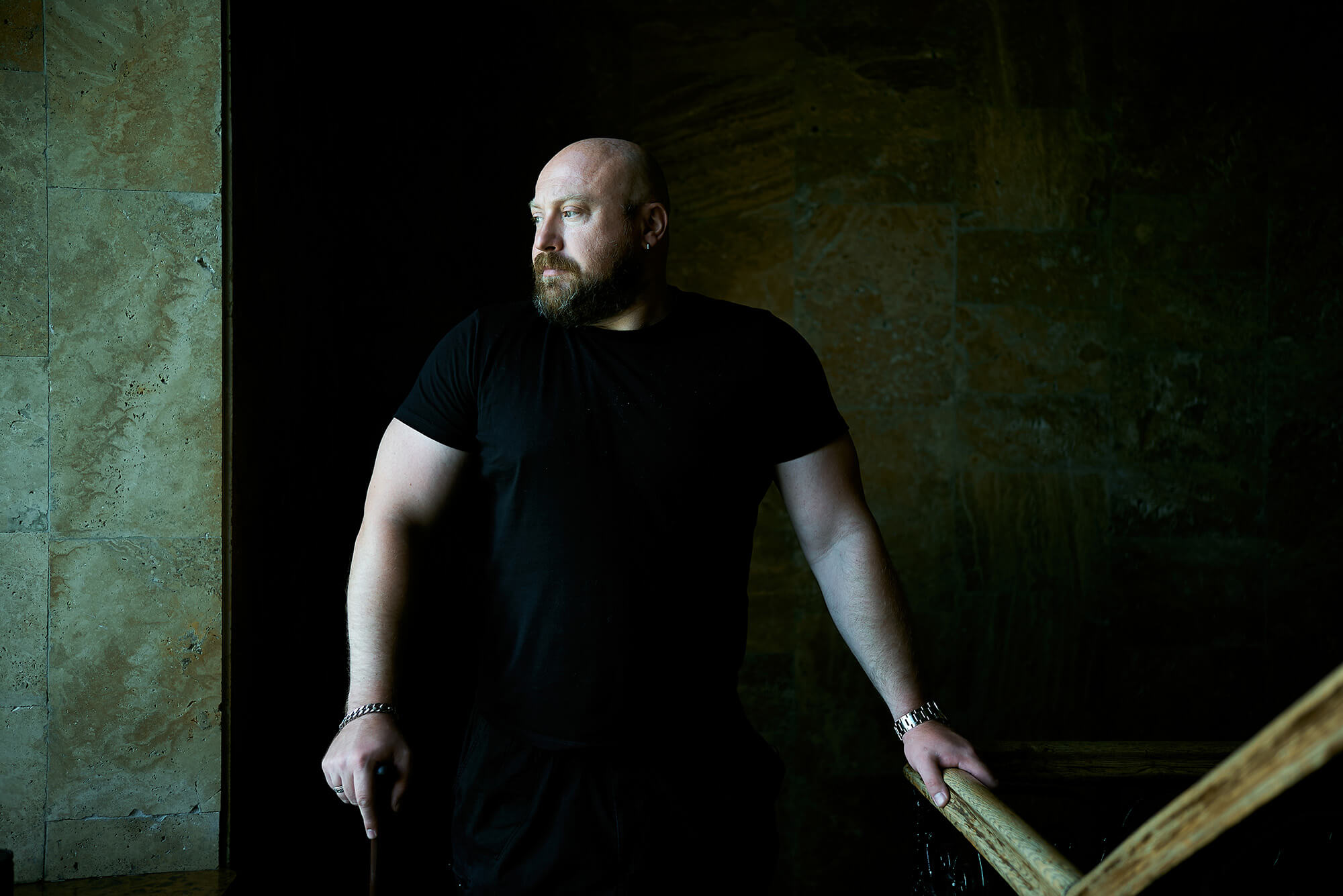
Taras grew up in Lutsk, in one of the neighborhoods on the outskirts, where he says “In the 1990s there were three street lights.” In this area, boys were educated in yards and basements and learned to survive without money. Reflecting on the turbulent years the late 1990s and early 2000s, Taras recalls, “I had to communicate with people with whom you have no right to make a mistake., That’s how I learned to value words and actions.”
This spirit, this character brought Taras into business. He graduated from a technical university, worked at various enterprises, and then tried to create his own firm. First, it was a real estate company, then a brokerage office. When consumer loans became problematic with the beginning of the Maidan, he closed his business and started working for a friend’s company that specialized in plumbing and heating. After COVID-19, when the company was stagnant, he went to Warsaw to do business in the same field.
In the winter of 2021, Taras came home on vacation and really wanted to finally take his wife and two daughters to Poland: one was already a student at that time, and the other was a schoolgirl. But war was in the air. He called the Lutsk Territorial Deferense battalion, which would later become his family. He asked if there were any free vacancies. They said, “Come on the 24th.” And on February 24, it became clear that the battalion didn’t care about Taras that morning.
“Dad, is this a war?” his daughter asked at sunrise as fire and smoke from the airport were visible through the window of the apartment in the 40th neighborhood.
The same day the children were taken to the border with Poland, handed over to friends there, and he and his wife Ania returned. On Feb. 26, Taras packed his backpack and went to his battalion. For some time, the brigade was defending the territories bordering Belarus, preparing the forests and swamps between Polissia’s villages to prevent a possible attack. And they were also preparing themselves through training and coordination exercises. In March 2022, Taras’ battalion moved to Bakhmut. It was during some of the hardest days and weeks of the battle for the city.
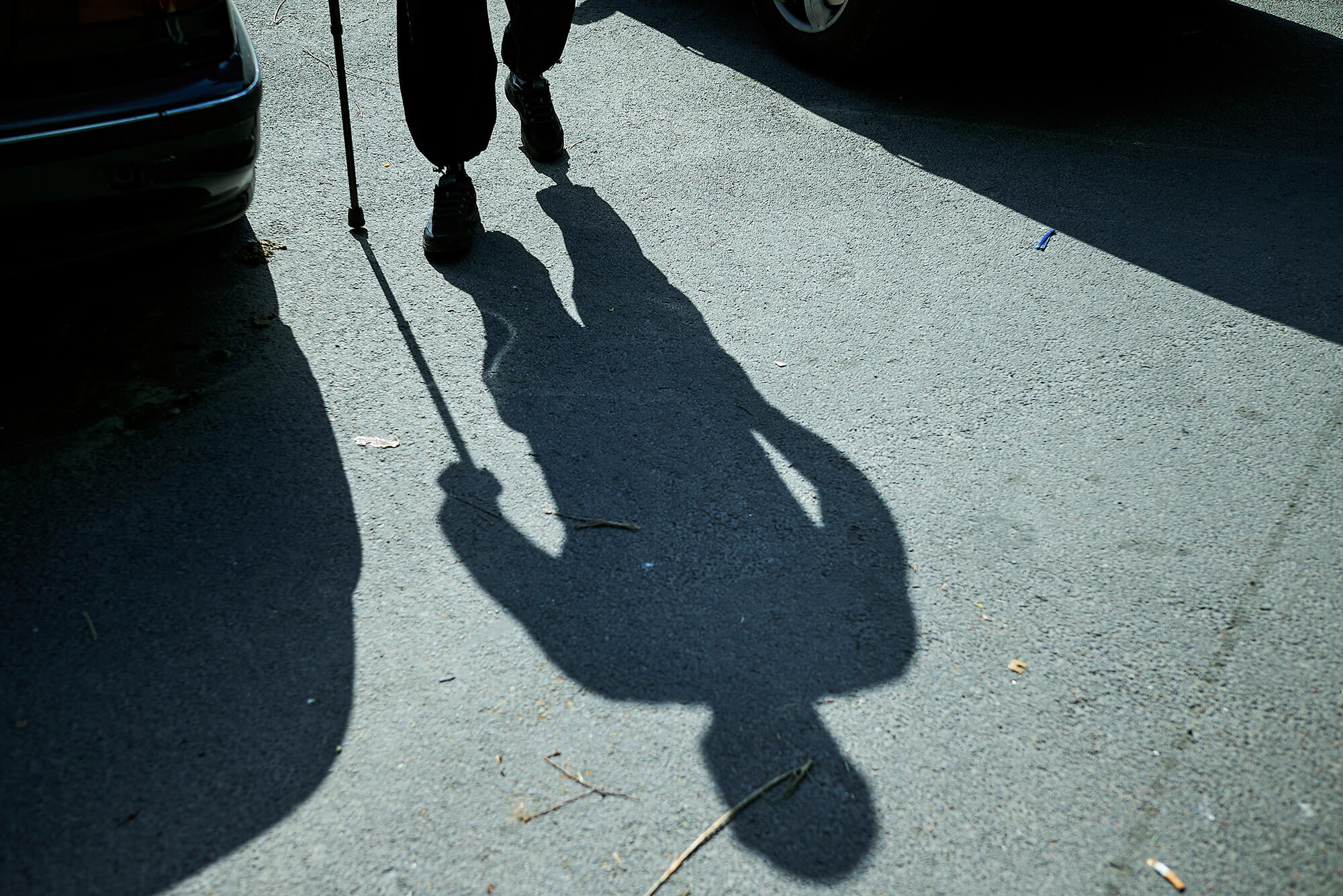
“Mortar shelling. A 120-caliber mine, near Bakhmut,” Taras usually says, so as not to explain for a long time where he has lost his legs. He pauses but then continues. “We hadn’t even taken up positions yet. They seemed completely unnecessary, but we had orders, The Russians began to take us by assault. They were shelling from three sides. The three of us ran to reinforce. Yura rushed forward and died; only recently they have been able to bury him. Sasha and I were a little behind. I said to him ‘Sash, hide, because this flight is coming after us.’ The ground, forest belt, there was some kind of hole, I pushed myself somehow into it… I put my legs up, because I didn’t care so much about them. It was incoming strike. I immediately felt that my legs were numb. Sasha got wounded, he screamed, but in two minutes, he fell silent. . His body hasn’t been taken yet. Ours yielded. The guys pulled me out and spent three hours to get me to the car. The shelling was rough. Well, it’s nothing.”
Let’s do something
“There are many wounded and many veterans with amputations in Lutsk. Some of them go in for sports, which is a lifesaver. Others are not athletes. There are guys who remain in their shells after being wounded, sometimes accompanied by alcohol, but that doesn’t lead to anything good,” says Taras.
Since the age of 15, he had been engaged in sports, particularly weightlifting, and trained at a local sports association named Kolos. He became older, got injured and had to end his sports career, but he always kept his weight in check. . After the injury this experience helped a lot.
“It wasn’t me who went to the gym, but the gym came to me. My good friend, coach Oleh Khomyak came to see me. Before joining the army, I worked out in his gym in my home neighborhood.”
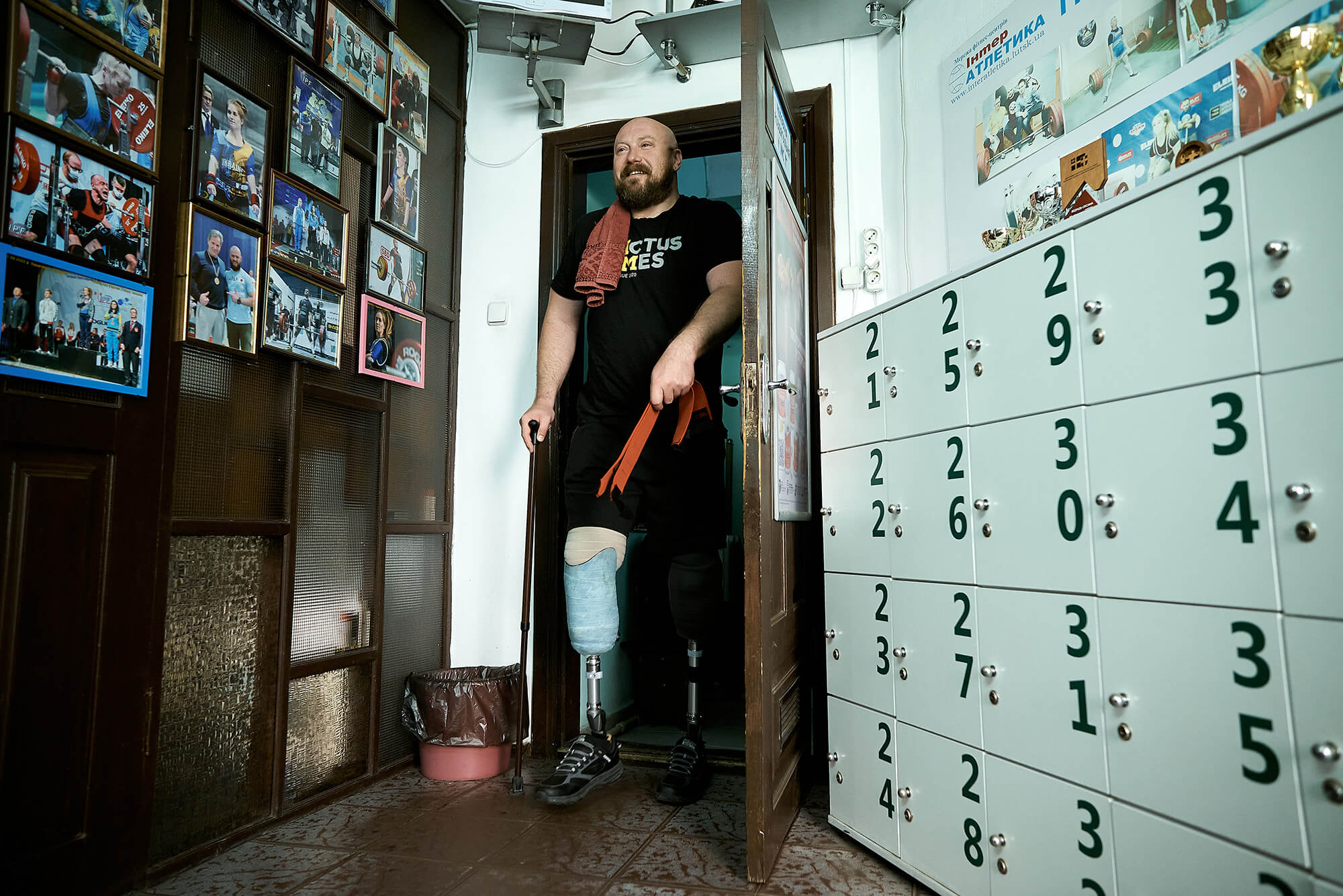
Taras was lying in the ward of the regional hospital, still without prostheses. Oleh came in, looked at him and said, “Listen, let’s do something.We need to get you in shape, because you’re out of shape, your muscles have completely lost their tone.”
It was Sunday when Oleh came with his wife Natalka, and on Tuesday, he returned to the ward with expanders and a yoga mat to lay on the floor. The same day they began to restore muscle tone. Oleh helped Taras climb from the bed to the floor and they worked together.
Later, Taras worked hard in rehabilitation centers. He “didn’t leave” the hall and pool at Superhumans, a center in Lviv where prostheses are fitted, and people are taught to live with them. In the winter, Vasyl Virastyuk came to Lutsk with the Trenvet UA initiative to adapt and rehabilitate veterans through sports. They got to know each other, and it was Virastyuk who convinced the veteran that it was time to go pro. Currently, Taras trains simultaneously in two gyms: twice a week near his home and once a week at the Plaza sports club which is a partner of the initiative.
“On Palm Sunday I went to Kyiv to take part in the competition of veterans, soldiers and athletes ‘Kyiv Nezlamnyi.’” I won a few medals there and had a lot of fun. I realized something. You meet with like-minded people, with the same guys. And you see that people don’t give up. I tell all the guys ‘Life doesn’t end there, it is transforming.’ You can do everything you used to do. Well, maybe just a bit differently.’”
For the past four months, Taras hasn’t used a wheelchair in his apartment in a typical Soviet multi-storey building. The building is half a century old, and. the elevator is cramped. Even before he had prostheses, Taras felt how the limitations of the space didn’t consider the needs of people with amputations.
“When I was in a wheelchair, I couldn’t get home, it’s just impossible to enter the elevator. And if someone carries you to the 7th floor, it’s not a solution. So, I stayed in one hospital, then in another one, and was waiting for my leg. It’s a horrible feeling when you’re a kilometer or two away from home, but you can’t get there.”
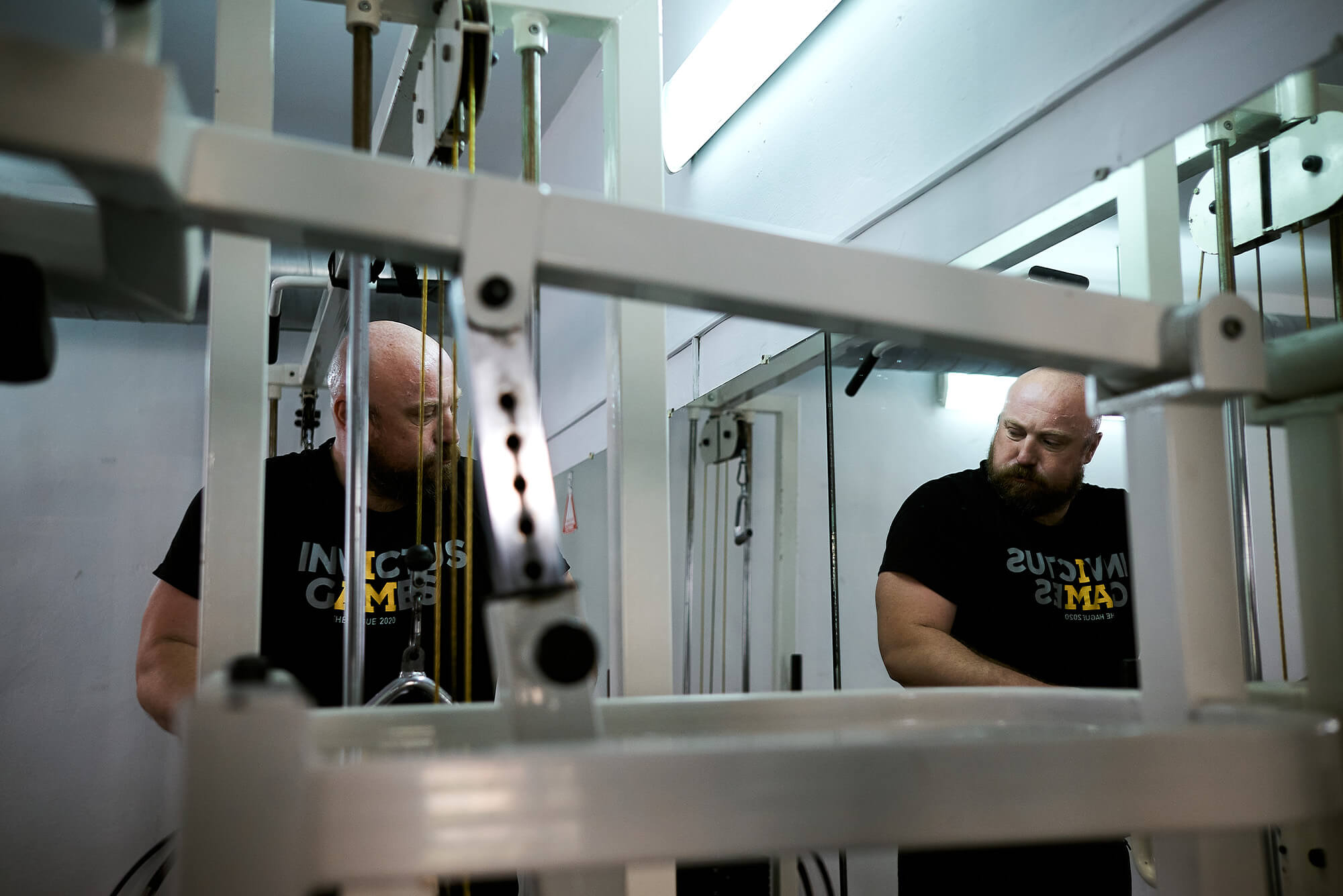
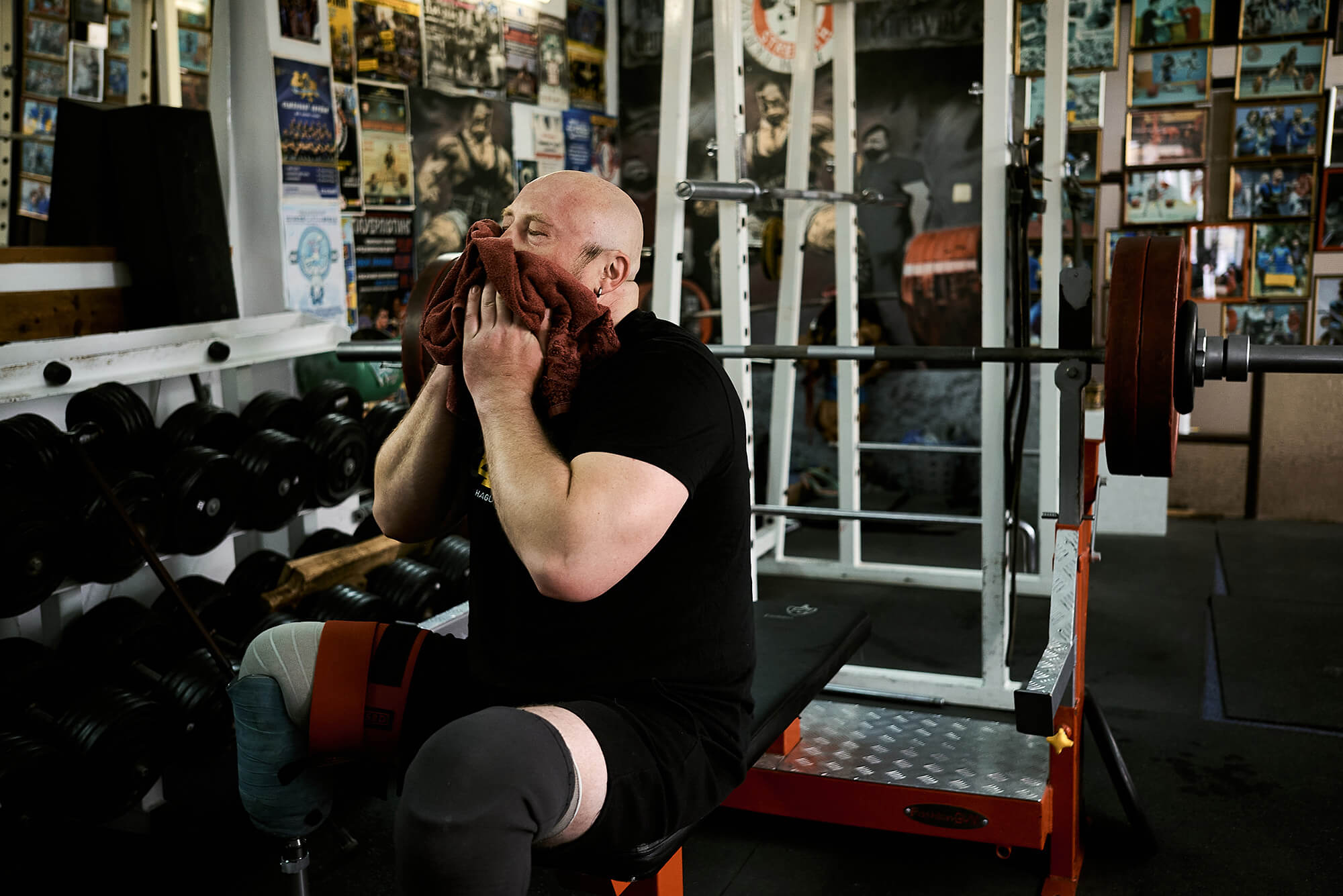
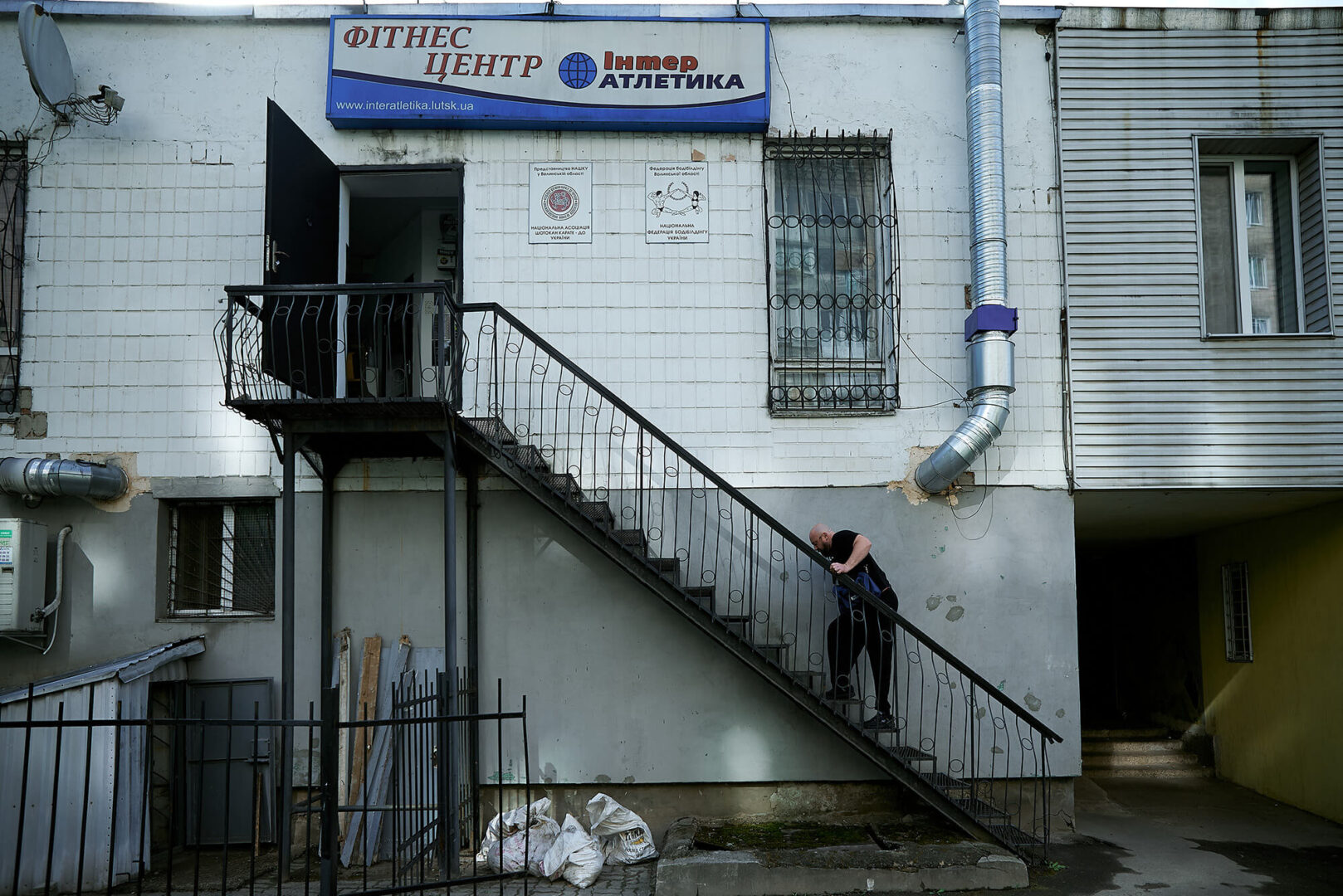
Even for him, a person who takes care of his physical shape every day, it’s not easy to go down the stairs from the 7th floor. And he had to navigate the stairs on prostheses, both downstairs and upstairs.
“In case of trouble, if, say, there is no light, I will go upstairs and downstairs, but it won’t be fast,” he says. “Everything is fine now: I get into the elevator, then into the car and I go to work. Well, either—into the elevator, into the car, to the gym, home into the shower—and then to work.”
Slovak
In autumn, Taras was invited to a meeting with the mayor of Lutsk. The mayor immediately offered him a pro bono position as an adviser on veterans’ issues,, to oversee the activities of the future veterans’ hub. Taras thought it over for a minute or two.
“Such things are accepted quickly. Or not accepted at all.”
When Taras Sasovskyi works in the city’s hall, where he has a small office on the first floor, his car is usually parked in the backyard. He doesn’t spend much time in these walls; most veterans or their relatives know how to find him outside the office, call him or reach out to him on social media. Then he “takes on the issue ” and goes with it, knocking on different doors. He walked this path himself. Most issues are related to various certificates regarding discharge from the army and handling paperwork within military units. A separate field of work is about requests to the Lutsk territorial community to purchase things needed at the front. Taras is a member of such a working group and one of the mediators between the mayor’s office and the military..
The inscription “Slovak” is still affixed to the windshield of his car. He drives with it around the city. This is his call-sign. Many soldiers may not know him as Taras Sasovskyi, but they do know as Slovak. In fact, the call-sign explains partially why Taras considers it as his duty to protect Ukrainian land from Russian occupation.
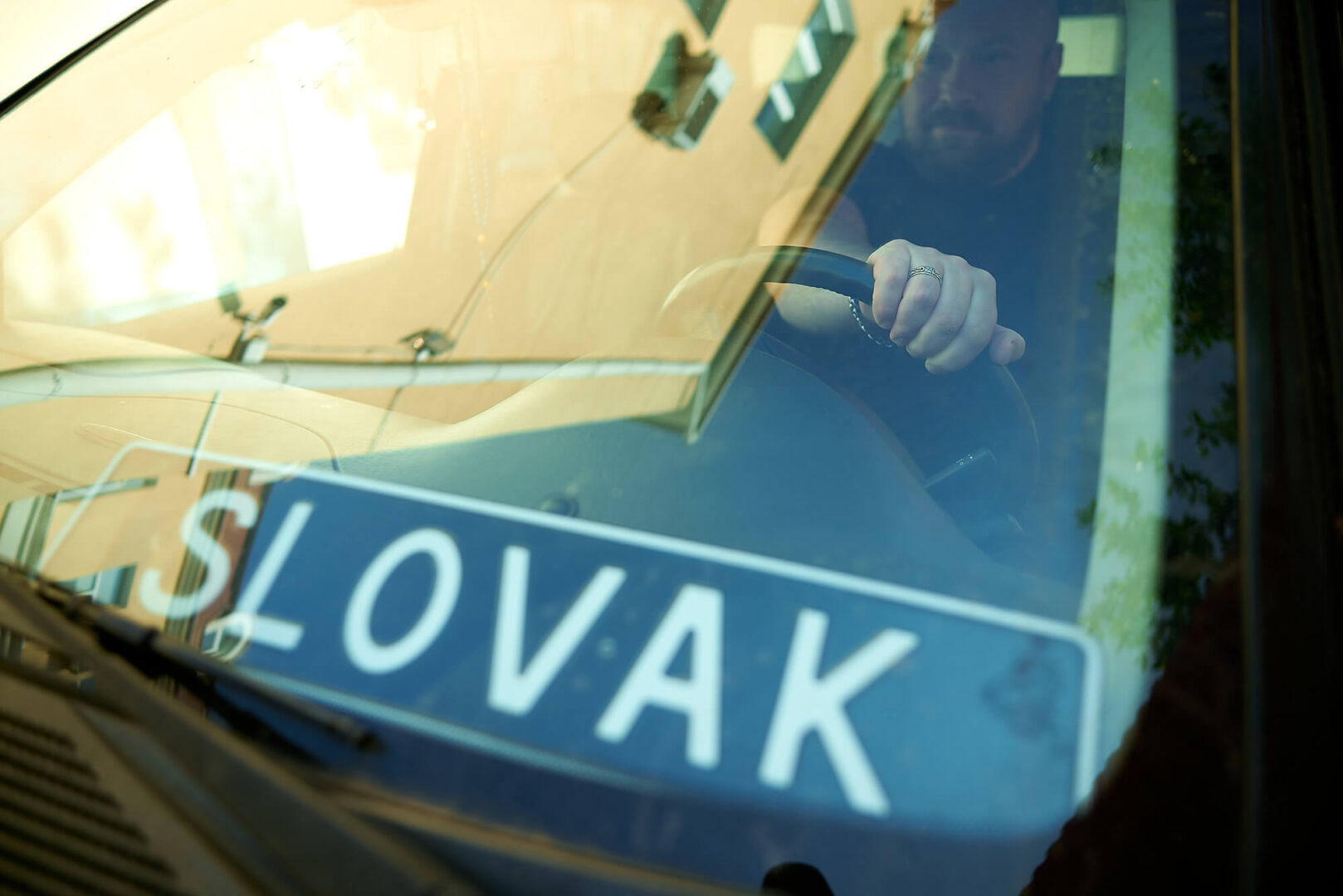
Both of his grandfathers fought in World War II. They didn’t talk much about the war, and now he understands why those stories were so “smoothed out.” He tells his children about the war in a simlar way, protecting them from the terrible details. One grandfather found himself in Volyn in 1947 as a result of the so-called optation of Ukrainians from Czechoslovakia. In general, optation is a voluntary choice of citizenship when territories change jurisdiction. i Residents either remain citizens of the state that lost the territory or acquire another one—the state that got the land or that was formed. But in those days, there was no issue of voluntariness. Furthermore, ethnic Czechs were resettled—essentially deported—from Volyn, while ethnic Ukrainians from the Pryashiv region, who were deported from the former Czechoslovakia (now Slovakia), were settled in their houses according to an agreement with the USSR.
“I knew Slovak earlier than Ukrainian. As a child, I listened to Slovak fairy tales. My grandma cooked various ‘polivky −their dumplings with cheese or sauerkraut. At Easter, I still make cheese according to the recipe they brought from there and preserved. I won’t give up those roots, many of my ancestors are buried there. I plan to go there again. Grandfather’s family house is still preserved,” says Taras.
When he had to choose a call-sign, he picked “Slovak,” because he knew it would be unique. At the front, he had the same name on his car “The whole brigade knew that I was going.”He wore a Slovak flag on his front backpack, and when someone confused it with the Russian one, he laughed and answered “Yeah, you skipped geography at school.”“And history as well,” Taras adds. “The Soviet Union really was a ‘prison of peoples,’ as evidenced by the history of my family’s ‘voluntary’ deportation.’”
“People didn’t have a choice. That delicious plombiere ice cream for which the people of the USSR are nostalgic, came with a great cost—a lot of blood. Today, the Russians have the same thing, the same Union.”
The war for identity and the right to choose continues, so Taras doesn’t remove his call sign from his windshield even in civilian life.
New legs will lead to a new path
When you have to be a mediator between the authorities and the community, the advocacy mission can be emotionally challenging because it involves the war that Taras himself experienced. Many moments can be triggering. But this mission is extremely necessary. “You undertake to interact with a number of services because of the person whom you have undertaken to help, a veteran or one of their relatives. In this way, you influence public opinion.”
“People don’t come to me with good news; they come with problems. You listen to everything, you take to heart, sometimes it’s emotionally exhausting. I’ve learned to recharge with the help of training. I work out, leave the negativity in the gym, get a dose of dopamine and go back to work.”
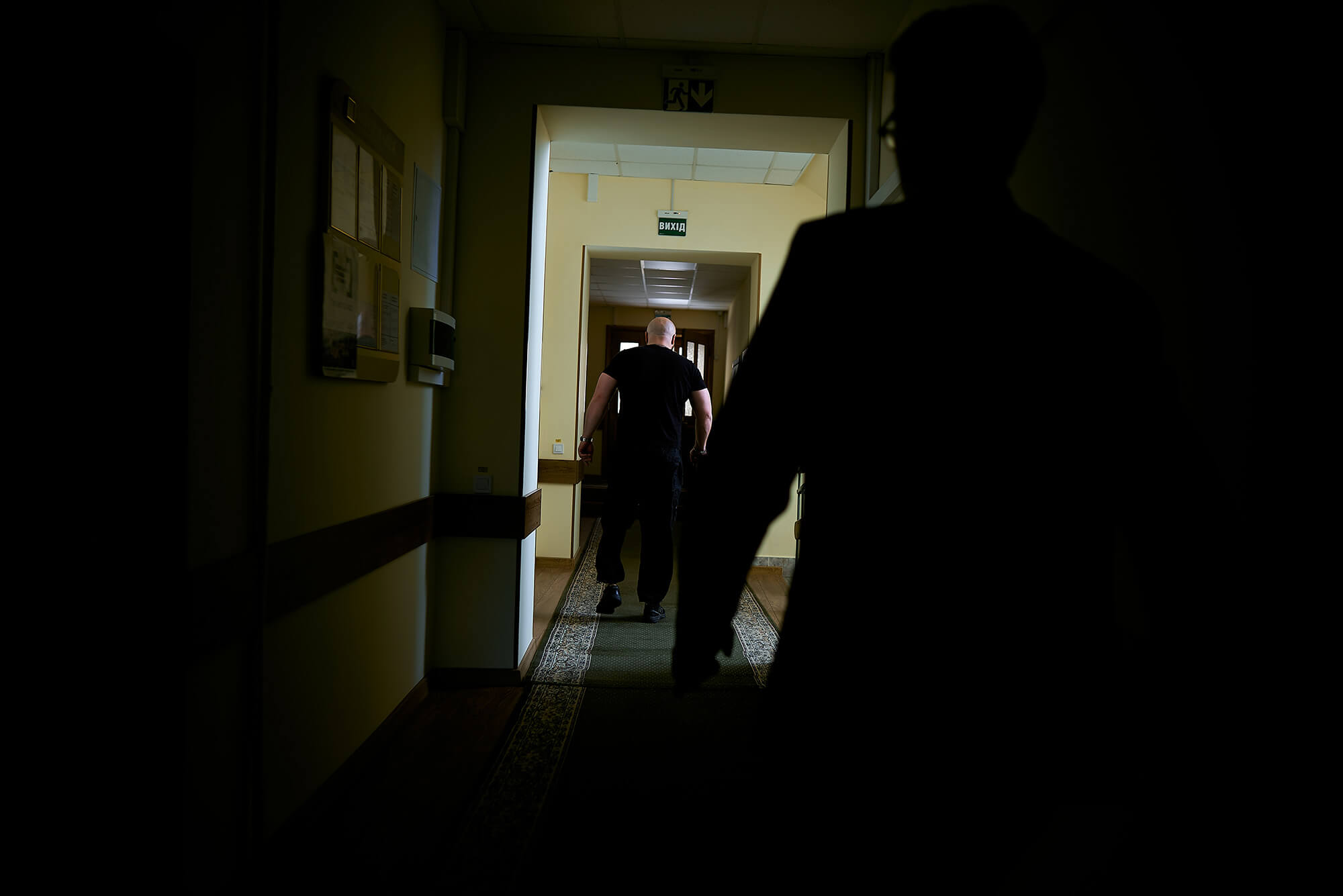
The lion’s share of Taras’work involves communications—conversations at different levels in the city where he lives and works—,about how to talk to veterans, understand them, and help them. Taras didn’t dream or plan to be the voice of veterans in Lutsk. He is a man of business, used to solving problems quickly and effectively, traveling around the world easily and, keeping his finger on the pulse of entrepreneurship.
“You have to be a media person. To tell, to share. I don’t just do it to help veterans like me, amputees. I also do it for the people who still don’t understand what war is. Maybe my words will explain something to someone,” he says.
Taras doesn’t tolerate being treated with pity, and he wants everyone who communicates with veterans to hear this. He just thanks “the pixel souls,” as he calls the soldiers of the Armed Forces, for enabling him to walk, drive, work, train and live.
“One of my friends said, ‘I wish that your new legs would lead you to a new path.’And it’s true. My life has changed a lot. After having been wounded I met many interesting people. I plan to go to the competitions. There is an opportunity, and you have to live.”
He still has the feeling that many people, especially from the older generation, don’t know how to adequately treat veterans and respond to people with amputations. These people grew up at a time when such things were not talked about.
“There are problems in our city, like any city… There are challenges for wheelchair users and for blind people. Even if I can confidently walk the stairs, there might be stairs that are difficult to navigate or they are uncomfortable. Often these are stairs to institutions. It’s common for there to be no handrail: it makes life difficult. But everything will be addressed, just not all at once. We want them to realize that once upon a time, there were veterans who were gray-haired old men who went to schools and told “fables.” And now the veterans are guys in their 20s. I have two older cousins and two nephews fighting. My nephews are almost children, but they have already been psychologically broken. Now the most important thing for them is to return and see that life has adapted to them.”
On anniversary
Taras takes us to see the site of that potential veteran hub in Lutsk, which the city and heare currently working to create.
He started driving with prostheses already, and his Mercedes is going slowly but confidently. Taras passes cars, overtakes trolleybuses, and eventually parks by the walls of the building.
One part of the building is alive, while another part is trying to survive. In some places, birch trees are growing on it.
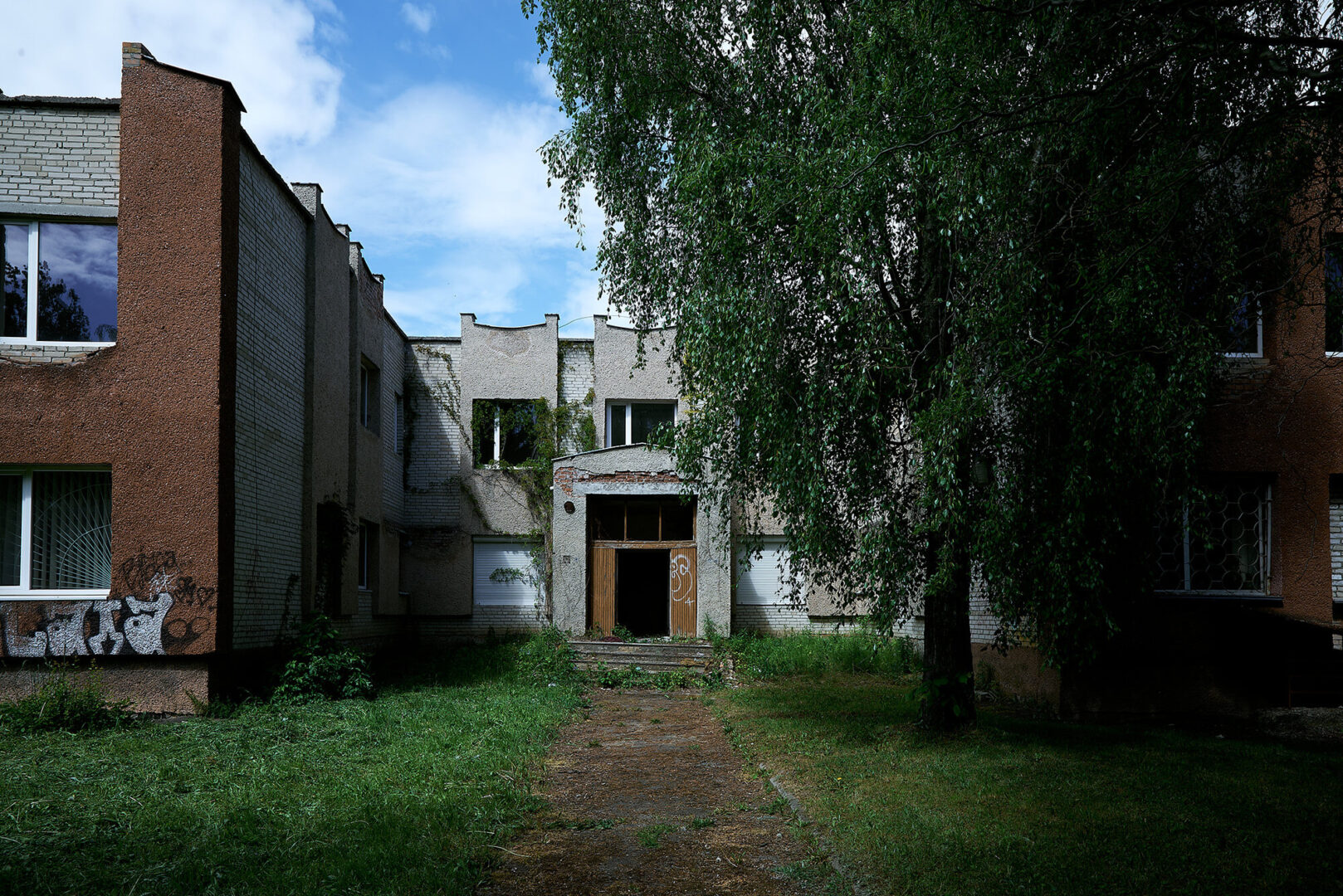
This is a former kindergarten, which ceased to be a kindergarten back in the 1990s. Next to it, there is a medical clinic, a labor archive, one of the departments of the city council and a small police station for a district police officer. In the middle is the porch to the central entrance, which no one uses anymore. It’s overgrown with ivy. Someone drew a row of hearts with chalk on the faded wooden panels, typical of the former interiors of kindergartens.
All around is space.
“Here could be a location for outdoor events. Just put up some gazebos,” says Taras, crossing the yard with trees.
These walls appealed to him with their space, allowing him to carry out all his plans. The location is easily accessible and has a large car park. The areas of the building given to the hub haven’t been used for many years and require major renovations, including replacing r communication equipment, windows, doors, insulating the facade and covering the roof− 50 million hryvnas have been allocated for everything. Now, they are preparing for the reconstruction.
“I plan to go to the cities where such centers are already operating: to observe and communicate. It should be a facility where veterans can get answers to all their questions. There should be a psychologist, a lawyer—maybe several. There will be a desk from the Сenter for Provision of Administrative Services (TsNAP) so that people can get certificates on the spot. There will be a representative of the employment service: many guys are looking for work. There should be a gym with adaptive equipment simulators, and we need rehabilitators there so that the guys can come and use this gym. It must be functional! It must meet the needs. This is definitely not a place for specialists to work on a regular basis. It won’t operate like that,” the veteran says, full of emotions.
In order to make it all work before these walls are ready, the veterans’ hub is temporarily preparing to open in another space. The war lasts, and the times are such that trouble often outpaces reconstruction.
Stocky Taras—a warrior, a veteran, a weightlifter—slowly moves along the path where the grass has long occupied the asphalt. He confidently supports his solid frame on two prostheses.
We are walking on the very day when Taras was seriously wounded near Bakhmut a year ago. It was May 15 when his comrade with the callsign Bankir died while covering Taras’ evacuation. The Slovak is dressed in black and smokes from time to time.
“Today is the day, the anniversary of when I was hurt, when it all happened,” he pulls at the smoke, almost saying “year…”
Taras recalls the mornings in Donbas. “There, spring is just as sunny and green,” he says.
“Everything is ruined, cut, but green wins. Life takes its course, nature shows us this. Do you know what surprised me there in the spring? Once the battle subsides—and you hear the birds singing. Just like here now…”
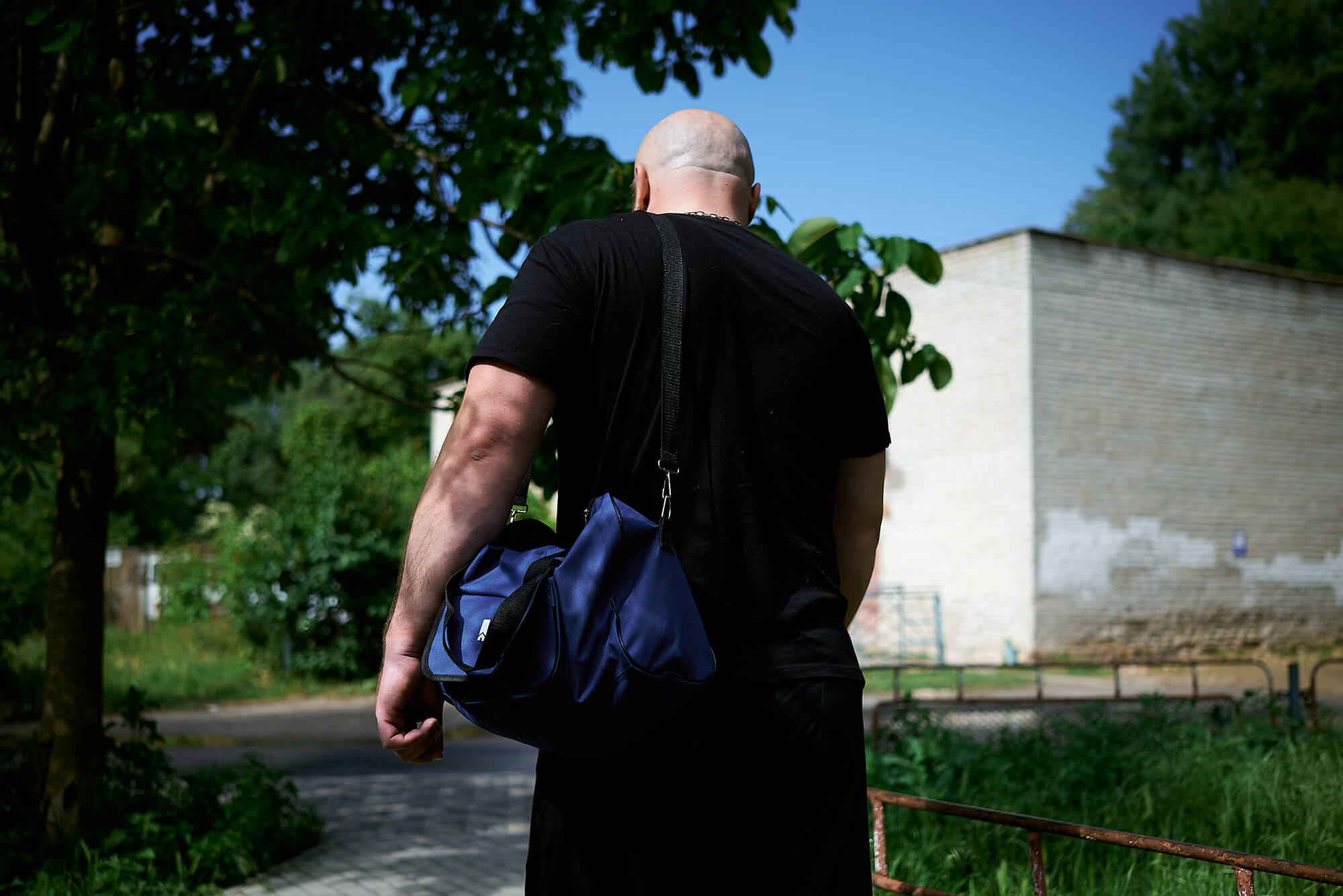
“The Power to Continue” is a collaborative project between the United Nations Development Programme in Ukraine and Reporters. Our goal is to share unique stories of veterans and civilians who have lost limbs in Russia’s war against Ukraine, and not only found the strength to survive the trauma but also became drivers behind social projects and bold business ideas. We also highlight the stories of people who have helped them along the way. While there are not many of them, these people inspire and speak openly about their experiences, and this might become a starting point for others.
The special project was initiated by Reporters with the assistance of UNDP in Ukraine and financial support from the European Union as part of the “EU4Recovery—Empowering Communities in Ukraine” project. The opinions, recommendations, assessments, and conclusions expressed in these materials do not necessarily reflect the official position of UNDP, the EU, or their partners.
Have read to the end! What's next?
Next is a small request.
Building media in Ukraine is not an easy task. It requires special experience, knowledge and special resources. Literary reportage is also one of the most expensive genres of journalism. That's why we need your support.
We have no investors or "friendly politicians" - we’ve always been independent. The only dependence we would like to have is dependence on educated and caring readers. We invite you to support us on Patreon, so we could create more valuable things with your help.
Reports130
More


